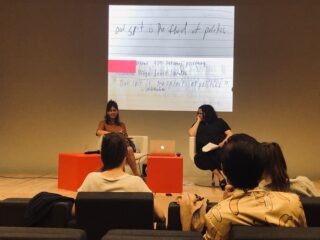Hazel Meyer and Christine Shaw
Centre culturel canadien
May 27th, 2019
20:00 - 21:30
A conversation between Canadian artist Hazel Meyer and Canadian curator Christine Shaw about the TAKE CAREexhibition presented at Ferme du Buisson until 21 July 2019.
This talk by Meyer and Shaw will pivot on a line from a poem by Canadian poet Lisa Robertson, “Our spit is the fluid of politics,” in order to draw out the relational, world-building capacities at play in their respective practices.
Hazel Meyer is an interdisciplinary artist who works with installation, performance, and text to investigate the relationships between sport, sexuality, feminism, and material culture. Her work aims to recover the queer aesthetics, politics, and bodies often effaced within histories of sports and recreation. Drawing on archival research, she designs immersive installations that bring various troublemakers—lesbians-feminists, gender outlaws, leather-dykes—into the performative spaces of athletics. She often works collaboratively with her partner, media historian Cait McKinney. Together they explore their shared attachments to queer histories and accessibility politics through research, writing, video and archival interventions.
Christine Shaw is Director/Curator of the Blackwood Gallery and Assistant Professor in the Department of Visual Studies at the University of Toronto Mississauga. Her programming direction takes a critical stance on social, political, and ecological urgencies, sets out to develop durable visual-cultural literacies, and invites publics to create new encounters in the common struggle for a future.Her commitment to curatorial experimentation and social resilience has been applied to long-term collaborative projects including TAKE CARE, an exhibition series involving artists, activists, careworkers, curators, and researchers critically engaging the crisis of care at Ferme du Buisson (2019) and Blackwood Gallery (2017–18).
In the TAKE CARE exhibition at Ferme du Buisson, ten artists question how art, activism, mutual aid, feminism, Indigenous knowledge, queer desire, creative survival, and a closer relationship to the land can contribute to a better recognition of care as a social and cultural force.



